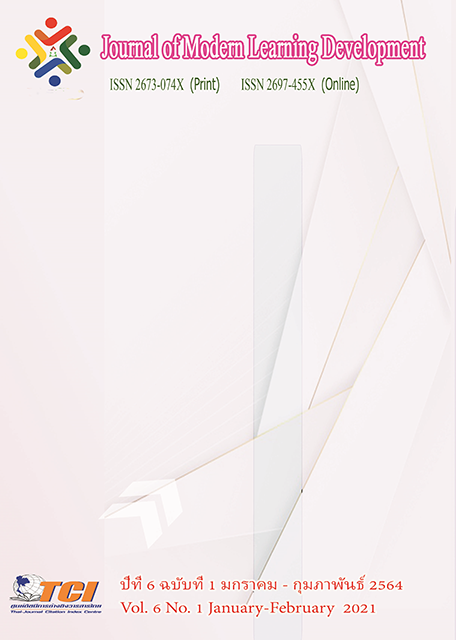The Personnel Administration in Accordance with the Four Gharavasa Dhammas of the Administrators of Phrapariyattidhamma Schools General Education in Khon Kaen Province
Main Article Content
Abstract
The objectives of this research paper were: 1) to study the status of the personnel administration in accordance with the Four Gharavasa Dhammas of the administrators and 2)to present the guideline to promote the personnel administration in accordance with the Four Gharavasa Dhammas of the administrators of Phrapariyattidhamma Schools, General Education Department in Khon Kaen Province. This study was carried out by means of mixed method research. For the quantitative research, the samples included 188 informants, selected by sampling. The tool used in this research was the questionnaire. The statistics used in the data analysis were: Frequency, Mean, Percentage and Standard Deviation. For the qualitative research, the target group included 8 cases selected by the purposive sampling. The tool used in this stage was the interview form. The obtained data were descriptively analyzed.
The research results were as follows:
1. The level of the practice of the personnel administration in accordance with the Four Gharavasa Dhammas of the administrators of Phrapariyattidhamma Schools, General Education, in Khon Kaen Province was moderate. Considering the studied aspects indicates that all aspects showed the moderate level of practice. The highest score was seen in that of Caga (Generosity) which is the sacrifice of personal happiness for the public.
2. The guidelines to promote the personnel administration in accordance with the Four Gharavasa Dhammas of the administrators of Phrapariyattidhamma Schools, General Education, in Khon Kaen Province are proposed as follows: 1) terms of Sacca, that is, sincerity, honesty, transparency, the personnel management must be honest, sincere, transparent in the performance of one's duties, especially in recruiting and selecting personnel. 2) terms of Dama, which is to fix flaws, to control the mind, in the personnel management, parents or experts are invited to take part in the education without using personal emotions. 3) terms of Khanti, which is perseverance, development and stability, personnel management requires more reasons for judgment rather than using emotion to judge one's subordinates, strengthening the organization.The administrators must be open-minded to listen to the reasons for each proposal. 4) terms of Caga, which is the sacrifice of personal happiness for the public, the administrators should devote time to control, supervise and monitor personnel to perform their duties to the best of their ability, willingness and full time.
Article Details
References
กิตติ ธีรศานต์. (2544). เทคนิคการบริหารโรงเรียนพระปริยัติธรรมแผนกสามัญศึกษา ม.ต้น และ ม.ปลาย. กรุงเทพมหานคร: โรงพิมพ์การศาสนา.
คณะทำงานและคณะอนุกรรมการ. (2557). คู่มือปฏิบัติงานเกี่ยวกับกฎหมาย กฎ ระเบียบ ประกาศ และ คำสั่งที่เกี่ยวกับพระปริยัติธรรม แผนกสามัญศึกษา. กรุงเทพมหานคร: สำนักงานพระพุทธศาสนาแห่งชาติ.
พระเมธีธรรมาภรณ์ (ประยูร ธมฺมจิตฺโต). (2534). คุณธรรมสำหรับนักบริหาร. กรุงเทพมหานคร: มูลนิธิ พุทธธรรม.
พระเส็ง ปภสฺสโร (วงษ์พันธุ์เสือ). (2554). การบริหารงานบุคคลในสถานศึกษาขั้นพื้นฐานระดับ ประถมศึกษาสำนักงานเขตพื้นที่การศึกษาประถมศึกษาปราจีนบุรี เขต 1. วิทยานิพนธ์พุทธศาสตรมหาบัณฑิต. บัณฑิตวิทยาลัย: มหาวิทยาลัยมหาจุฬาลงกรณราชวิทยาลัย.
พระครูสังฆรักษ์อภิชาติ สนฺติกโร (เดชชัย). (2555). การบริหารงานบุคคลตามหลักฆราวาสธรรม 4 ของผู้บริหารโรงเรียนประถมศึกษา เขตบางกอกใหญ่ กรุงเทพมหานคร. วิทยานิพนธ์พุทธศาสตรมหาบัณฑิต. บัณฑิตวิทยาลัย: มหาวิทยาลัยมหาจุฬาลงกรณราชวิทยาลัย.
พันตำรวจโท ณรงค์ธรรม บัวทอง. (2552). การพัฒนาตำรวจนครบาลตามหลักฆราวาสธรรม 4 : กรณีศึกษาสถานีตำรวจนครบาลนางเลิ้ง. ปริญญาพุทธศาสตรมหาบัณฑิต. สาขารัฐประศาสนศาสตร์. บัณฑิตวิทยาลัย: มหาวิทยาลัยมหาจุฬาลงกรณราชวิทยาลัย.
สมหมาย รัตตัญญู. (2552). ศึกษาความพึงพอใจการปฏิบัติงานของข้าราชการและลูกจ้างในกรม ชลประทานตามหลักฆราวาสธรรม 4. วิทยานิพนธ์พุทธศาสตรมหาบัณฑิต. บัณฑิตวิทยาลัย: มหาจุฬาลงกรณราชวิทยาลัย.
สำนักงานคณะกรรมการการพัฒนาเศรษฐกิจและสังคมแห่งชาติ สำนักนายกรัฐมนตรี. (2559). แผนพัฒนาเศรษฐกิจและสังคมแห่งชาติ ฉบับที่ 12 (พ.ศ. 2560–2564). กรุงเทพมหานคร: ม.ป.ท.
Krejcie, R.V., & Morgan. D.W., (1970). Determining Sample Size for Research Activities. Educational and Psychological Measurement.


